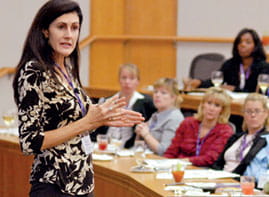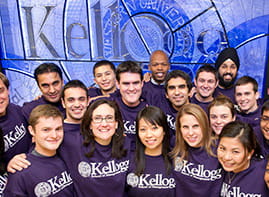Faculty-student teams face off over whether the global carbon footprint can be shrunk by private enterprise alone
3/16/2012 - Can the global carbon footprint be reduced by private-sector, market-driven initiatives alone?
Asked that question prior to a Feb. 28 debate on that issue, nearly 80 percent of the Kellogg students in attendance answered with a resounding “no.”
Those numbers didn’t daunt Professor
Mohan Sawhney and student Matthew Gold ’12, who had been assigned the pro-market position in the second of this year’s Kellogg Debates. “Good thing we’re salmon,” quipped Sawhney, noting the pair’s willingness to swim against the popular tide.
That spirit set the stage for a lively debate with Kellogg Associate Professor of Management and Organizations
Klaus Weber and Craig DePriester ’12, who took the position that public policy must play a role in reducing the global carbon footprint.
The hour-long debate was hosted by the Kellogg Student Association’s global affairs and academic committees and co-sponsored by the Sustainable Business Club.
David Besanko, the Alvin J. Huss Distinguished Professor of Management & Strategy, served as moderator.
As is conventional in formal debate competitions, the participants were assigned positions on either side of the issue, so the arguments they advocated did not necessarily reflect their own personal views.
Let the private sector run Arguing for the measure, Sawhney cited General Electric and FedEx as two notable examples of private sector companies working independently to decrease their carbon footprint.
“The fundamental fact is that green is good for green. What’s good for a company, the environment and society is good for the bottom line,” Sawhney said.
Gold added that less regulation and government meddling would inspire more environmentally mindful innovation from the private sector.
“The private sector may not turn the globe carbon-neutral, but it does have substantial power to reduce the world’s carbon footprint so long as the public sector doesn’t monkey in the markets and pick winners and losers,” Gold said.
More than private enterprise needed Weber, meanwhile, built his argument around the word “sufficient.” Private enterprise might spark positive environmental momentum, he said. But, he added, market-driven initiatives alone would not generate the needed impact.
“Real change requires government intervention and civil societies to push the private sector in the right direction,” Weber said. He noted that many solar, wind and nuclear innovations received government funding in their early development phases.
Identifying global warming as both an economic and human disaster, DePriester argued that public and private entities should work together. The market alone, he said, is inadequate for the challenge.
“There are isolated instances were companies are making headway, but we cannot duplicate swift action and change without a coordinated effort,” DePriester said.
Relevant issue Besanko said the debate’s topic was particularly relevant, given the strong opposition of Republicans and coal-state Democrats to policies such as cap and trade. With many legislative solutions to the issue of climate change on hold, Besanko said it will be largely up to the private sector to drive initiatives to reduce carbon emissions in the U.S.
“A key question is whether private sector initiatives will be sufficient to achieve the necessary reductions in an economy with one of the largest per-capita emissions rates in the world,” he said. “The debate was important because it explored this very question.”
Further reading: Kellogg Insight: Sustainability is a team effort 





